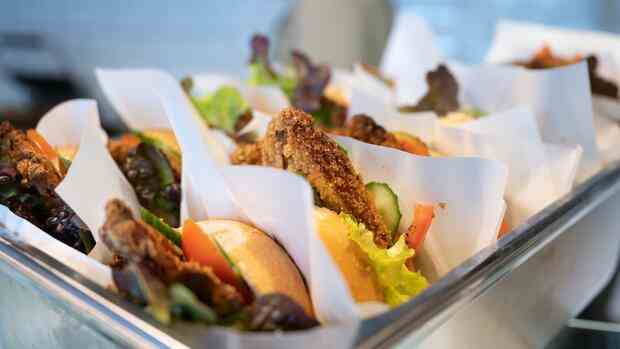The demand for meat alternatives has increased in Germany.
(Photo: dpa)
Berlin Germans are giving up meat more and more frequently: According to a survey by the non-profit Good Food Institute (GFI), around a fifth now consume meat alternatives at least once a week. However, the major suppliers of these alternative proteins have so far mostly not come from Europe.
That could now slowly change. While global investments in meat alternatives fell by 44 percent to 2.7 billion euros in 2022, European start-ups in this area were able to collect even more money than in the previous year. Investments increased by 24 percent to 579 million euros, the Good Food Institute calculated based on surveys by the data provider Pitchbook. This also reflects a catch-up effect, the GFI reports.
While the hype surrounding US giants like Beyond Meat slowly recedes, the European industry is growing. Recently, more and more established companies in Europe have recognized the economic potential of innovative start-ups, says GFI representative Carlotte Lucas. They are also increasingly investing in plant-based and cultivated alternatives. One example is the partnership between Rügenwalder Mühle and the start-up Mirai Foods.
Planted from Switzerland manages the biggest lap
The Swiss start-up Planted managed the largest financing round in Europe in 2022. In the summer, the Swiss raised 70 million euros from investors such as private equity firm L Catterton, which specializes in consumer goods.
Planted relies on proteins from peas, oats and sunflowers. The meat substitute products should have comparable nutritional values, but also a meat-like consistency and a taste that is as authentic as possible. Planted also cooperates with restaurateurs in sales and in the development of new products. The Swiss sell their goods in retail and ready-to-eat meals and supply the Deutsche Bahn, among others.
>> Read about this: Proteins from the fermentation tank – This is how start-ups want to replace cheese and meat
But meat grown in the laboratory from animal cells is also gaining in importance. The start-up Gourmey from Paris alone completed a financing round of 48 million euros in 2022. The company develops goose liver from a fertilized duck egg and its stem cells, which, fed with nutrients, multiply accordingly. These so-called cultured proteins could also become an alternative to meat from conventional farming.
Germany falls behind in investments
Fermentation is also becoming more important for meat alternatives. Most products can be made this way at a lower cost than herbal products. The biomass fermentation start-up Mushlabs from Hamburg raised the largest round of financing with 17 million euros. Mushlabs uses fermented mushroom spores to turn them into meat alternatives.
The pea protein start-up Greenforce, which gained twelve million euros in investments last year, succeeded in another large round of financing in the industry in Germany. Behind them came other companies such as Neggst and Perfeggt, who are working on plant-based egg alternatives.
Despite these success stories, German start-ups for alternative proteins play a minor role in Europe. In Germany, investments in the segment fell by 41 percent to just 53 million euros. The financing rounds in the industry have developed just as poorly as for start-ups in Germany overall.
More: Meat from the test tube – Gourmey reinvents foie gras
